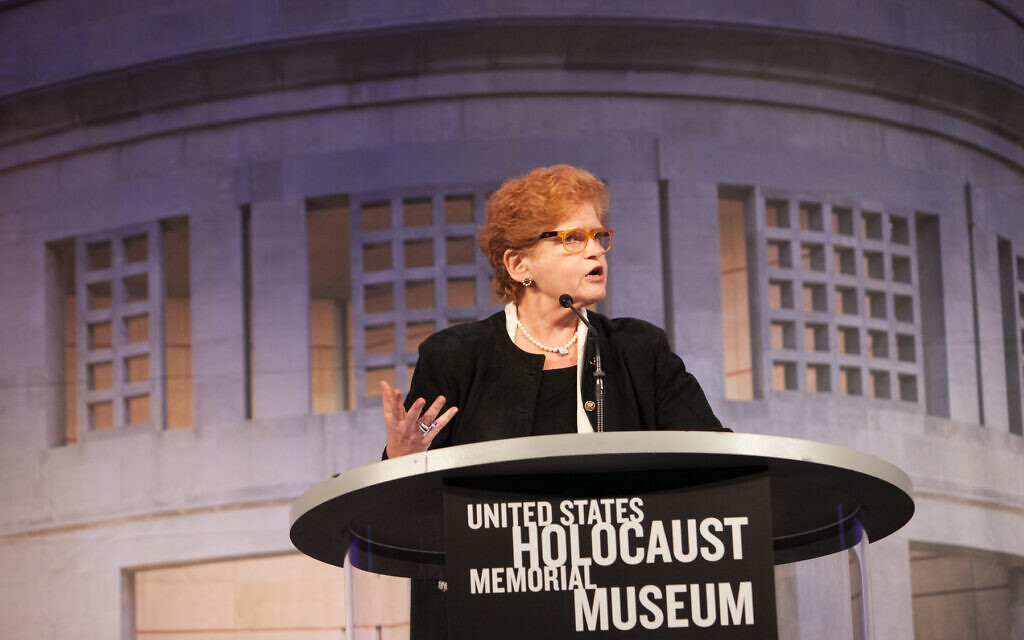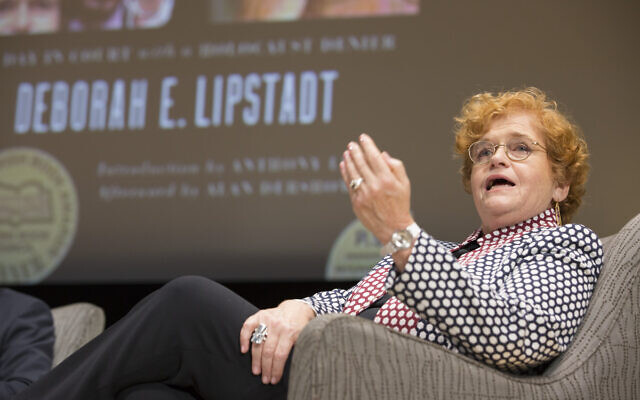Lipstadt Details Anti-Semitism During Pandemic
Leading anti-Semitism expert discusses attacks on Jews in virtual U.S. Holocaust Memorial program.
In what prominent Holocaust historian Deborah Lipstadt calls a conversation instead of a speech, the author and scholar will discuss the rise in global anti-Semitism during the pandemic and the past year during a Facebook Live program today sponsored by the United States Holocaust Memorial Museum.
Lipstadt, a Jewish history professor at Emory University, is excited about her dialogue with Edna Friedberg, historian and senior program curator for the museum, who will be moderating the virtual program.
“It should be a very interesting interchange; I look forward to it,” Lipstadt said, adding that it was a chance to learn from another expert on the Holocaust and Jewish history.
Lipstadt is a former chair of the museum’s Committee on Holocaust Denial and Antisemitism and the author of “Antisemitism: Here and Now.” The Holocaust Museum’s program today takes its name from the book.

Offering a sneak peek of what she will discuss today, Lipstadt said, “It’s been a little over a year since my book came out. How have things changed, how have things stayed the same?” Plus, she said she’d explore anti-Semitism during COVID-19. “It hasn’t gone away because of the virus. What are we seeing now? It will be a very up-to-date kind of conversation.”
Lipstadt said she has seen expressions of anti-Semitism during the health crisis. “Are we surprised? How come those protesting during the pandemic are using anti-Semitic imagery?”
This is not the first time anti-Semites have used a pandemic to spew hatred, she said. During the Middle Ages, anti-Semites blamed Jews for the black plague, also called the black death or bubonic plague. “Jews had nothing to do with the black plague,” Lipstadt said. “There is a connection between classic anti-Semitism and some of the things we see with the pandemic. They are not unrelated. The world thinks it has nothing to do with the pandemic; it’s a disease. But anti-Semites often have associated it with Jews. Nazis also often said Jews spread disease.”

She added that “anti-Semitism never rests.”
The virtual program today, part of the national museum’s weekly Facebook Live series, will also include how to respond to anti-Semitism “as individuals and as a society,” the museum noted in its press release on the event.
“From the vicious antisemitic attack in a synagogue in Poway, California, to the violent medieval antisemitic rituals on the streets of Pruchnik, Poland, the world has seen a surge in antisemitism. It continues to increase during the current pandemic and its accompanying isolation, fear, economic insecurity and increased reliance on the internet for information and interaction with others,” Lisa Leff, director of the museum’s Mandel Center for Advanced Holocaust Studies, said in the prepared statement.
 Although the lecture is virtual this year because of COVID-19, the Mandel Center typically brings a distinguished scholar to the museum every year to conduct innovative research on the Holocaust and to disseminate this work to the public. The scholar-in- residence also leads seminars and lectures at universities in the United States, as well as serves as a resource for the museum, educators, students and the general public. Lipstadt has lectured at the Holocaust museum before.
Although the lecture is virtual this year because of COVID-19, the Mandel Center typically brings a distinguished scholar to the museum every year to conduct innovative research on the Holocaust and to disseminate this work to the public. The scholar-in- residence also leads seminars and lectures at universities in the United States, as well as serves as a resource for the museum, educators, students and the general public. Lipstadt has lectured at the Holocaust museum before.
Today’s Facebook series is a major component of the museum’s expanded digital and educational offerings while the building in Washington, D.C., is temporarily closed. Viewers do not need a Facebook account to watch the programs live or on-demand on the Museum’s page.
Today’s program runs from 9:30 a.m. to 10 a.m. ET on Facebook, https://www.facebook.com/holocaustmuseum/




comments